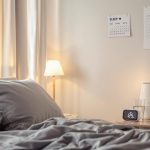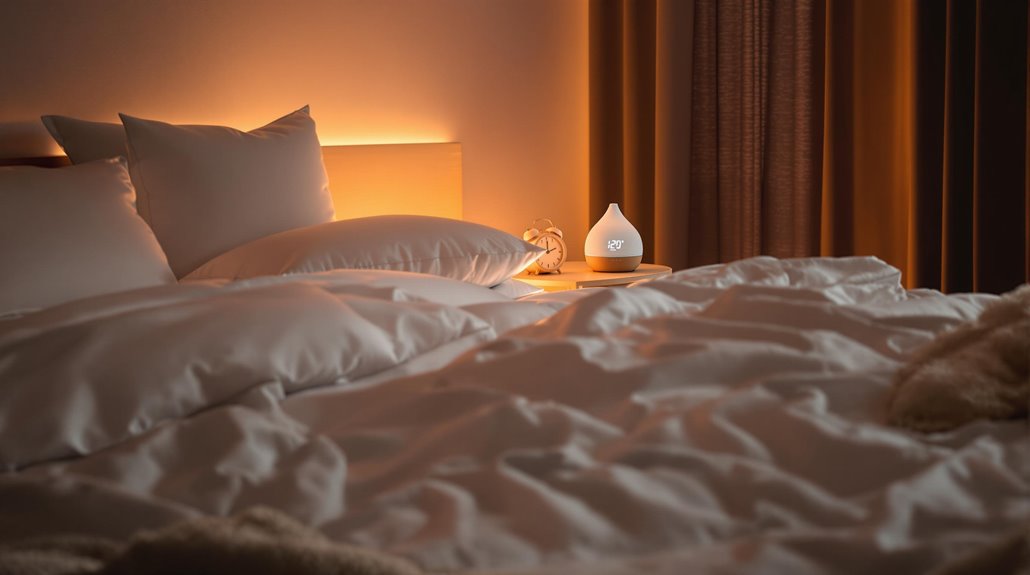
Mastering sleep hygiene is essential for transforming your nights into restorative experiences. Start with a consistent sleep schedule to sync your body with its natural rhythms. Adopt relaxing bedtime routines like mindful journaling or deep breathing exercises. Optimize your diet by consuming high-fiber foods and avoiding late heavy meals. Create an ideal sleep environment using dim lighting and noise control. Manage stress through hobbies and social connections, and exercise regularly while timing it wisely. Limit screen time before bed and embrace natural morning light. For even more effective sleep hygiene strategies, there’s plenty more to explore.
Consistent Sleep Schedule
A consistent sleep schedule is essential for maintaining your body’s circadian rhythm. By setting a regular wake-up time, you align your internal clock with the natural rhythm of life, which enhances your alertness and supports overall physical health. Sleep cycles become more efficient, ensuring restful nights and invigorating mornings. Consistency is your secret weapon against sleep disorders, anxiety, and the chaos of an unpredictable world. Fragmented sleep is often mistaken for aging, but it’s crucial to recognize that older adults require the same amount of sleep as younger individuals to avoid exacerbating health issues such as heart disease or depression.
Establishing a bedtime schedule is just as vital. When you commit to a specific sleep-wake cycle, you improve the quality and duration of your slumber. It’s not just about avoiding insomnia; it’s about embracing freedom from its grip. Cognitive function flourishes, focus sharpens, and your mental health receives a powerful boost. Regular sleep patterns have been linked to a 30% lower risk of mortality, providing you with not only peaceful nights but also a longer, healthier life.
Imagine waking up energized, immune system fortified, with stress melting away.
Taking practical steps to enforce this schedule liberates you further. Prioritize sleep, because it’s the foundation of everything else. Set alarms, but don’t dread them. They’re reminders of your commitment to wellness.
Resist the urge to sleep in to “make up” for lost hours, and fill your days with active routines. Embrace the rhythm, and life flows smoother.
Relaxing Bedtime Routines
Wind-down routines can transform your evening from chaotic to calm, setting the stage for restful sleep. You’ve got the power to release the day’s grip and embrace tranquility.
Start by practicing mindful journaling. Capture your fleeting thoughts on paper, letting worries and to-dos dissolve into ink. This clears mental clutter and ushers in peace.
Follow with deep breathing exercises, like the 4-7-8 method, to soothe your nervous system. It’s your ticket to a serene mindset. Incorporating physical activity and stretches into your routine can further ease your transition to sleep, enhancing both mood and energy levels.
Invite calming scents into your space to further enhance relaxation. A few drops of lavender essential oil can work magic, signaling your brain that it’s time to unwind.
Pair this with gentle yoga or stretches to relieve physical tension. Your body will thank you as it sinks into a state of ease.
Dim the lights and envelop yourself in the comforting embrace of a quieter environment. Banish the disruptive blue light of screens at least 30 minutes before bed.
The consistent application of a routine, like journaling or deep breathing, helps to establish better sleep patterns and supports your overall health. Instead, grab a good book or listen to soothing music. The liberation from the digital world fosters a deeper connection with yourself.
You’re the architect of your restful routine; design it to release and refresh.
Smart Diet Choices
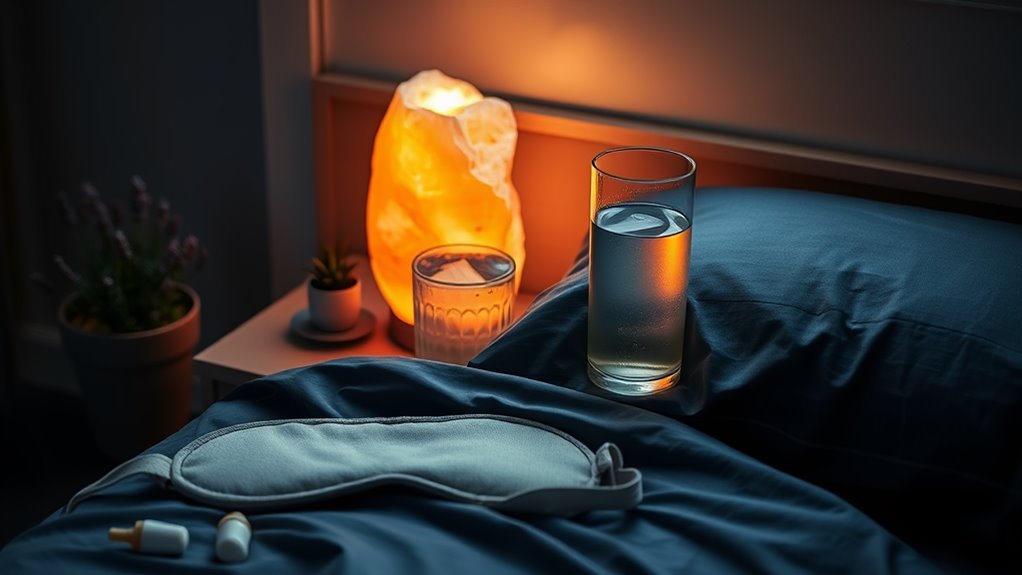
For better sleep, many find that making smart diet choices makes a significant difference. By focusing on fiber intake, you’re not just promoting digestion but also improving your sleep quality. Foods rich in fiber like fruits, vegetables, whole grains, and legumes can be your best allies for a restful night. Imagine freeing yourself from restless nights by embracing these high-fiber choices and allowing your body’s natural rhythm to thrive. Research suggests that diets low in fiber are linked to poorer sleep quality, emphasizing the importance of these nutritious selections. Additionally, reducing sugary foods is key in preventing sleep disturbances as they can interfere with restful, uninterrupted sleep.
| Fiber Intake | Sleep Supplements |
|---|---|
| Oatmeal | Tart cherries |
| Whole grains | Kiwi |
| Beans | Fatty fish |
| Vegetables | Nuts (almonds, walnuts) |
| Fruits | Milk and dairy products |
Embrace sleep-enhancing foods such as tart cherries, kiwi, and fatty fish. They can serve as natural sleep supplements, loaded with melatonin and omega-3s to embrace liberation from poor sleep. Be mindful, though—steer away from sleep-disrupting foods high in saturated fat and sugar, as well as caffeine and alcohol, to prevent tossing and turning. Instead, consider including whole grains and low-fat proteins during the day, but avoid heavy meals close to bedtime. By prioritizing smart diet choices, you’re stepping toward a night of freedom—one embraced by sweet, uninterrupted sleep.
Optimized Sleep Environment
Creating an optimized sleep environment can make all the difference in improving your sleep quality. Start by limiting bedroom lighting. Replace bright lights with dim ambient lighting as bedtime approaches. Consider blackout curtains or room-darkening shades to block external light. Removing bright alarm clocks or night lights helps too. If needed, use an eye mask to truly bask in darkness, signaling your body it’s time to wind down.
Noise control is equally important for a peaceful night’s sleep. Close your windows to tame intrusive outdoor noises and reinforce this with heavy window coverings. If total silence isn’t your thing, try white or pink noise aids – they can create a soothing backdrop that invites rest. For those truly sensitive to sound, earplugs might be your answer. Regular exercise can also contribute to better sleep quality, reducing insomnia symptoms and promoting restful sleep.
Beyond light and noise, comfort matters. Keep your room’s temperature between 68-72°F, a sweet spot for most sleepers. Experiment with bedding that maintains comfort and temperature regulation, and remember clean, allergen-free sheets promote better sleep. Daylight exposure has a role in supporting circadian rhythms, so it’s important to get plenty of natural light during the day to enhance sleep at night.
Embrace decluttering by moving electronics out and reserving your bed for sleep and intimacy alone. Craft a sanctuary that fuels liberation from restless nights, and true rest becomes yours.
Effective Stress Management
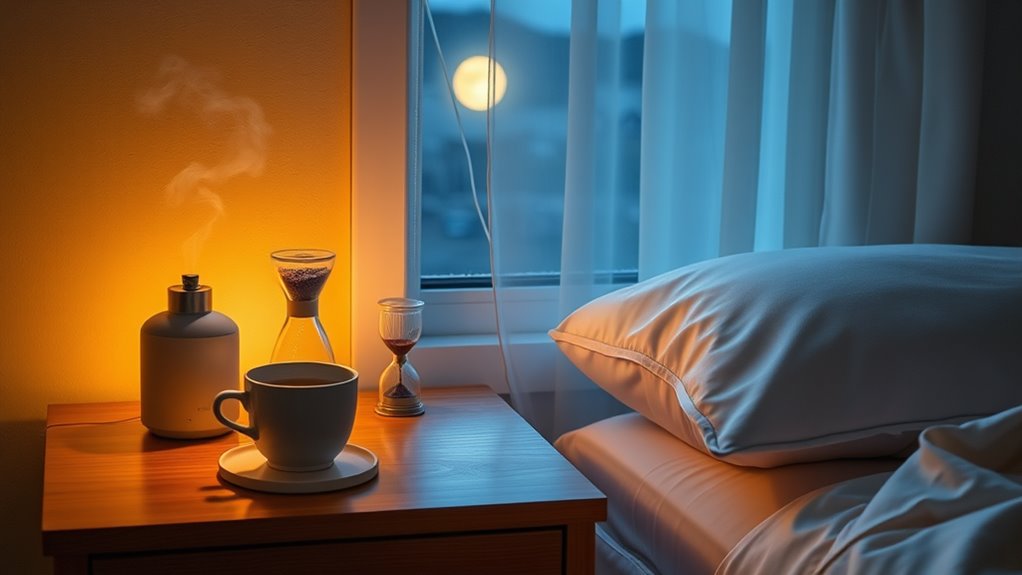
Effective stress management is vital for maintaining both mental and physical well-being. To truly liberate yourself from the chains of stress, you need to incorporate strategies that offer long-lasting benefits. Embracing mindfulness techniques can transform how you handle daily pressures and pave the way to better sleep.
Start by making conscious physical and lifestyle adjustments:
- Engage in regular exercise to elevate your mood and diminish anxiety.
- Prioritize a balanced diet rich in vitamins and minerals to bolster your body’s stress resistance.
- Cut down on caffeine and sugar to avoid energy crashes.
- Avoid alcohol and cigarettes, as they might offer temporary escapes but ultimately worsen stress.
- Confirm you’re getting enough sleep to enhance your ability to handle stress.
Incorporate relaxation techniques such as deep breathing and yoga into your routine. These practices calm the nervous system, contributing to effective stress relief.
Social connections play a significant role, too; surround yourself with supportive people, and eliminate unnecessary stressors from your life. Engage in activities that bring happiness, such as hobbies or laughter.
Always be mindful, staying present in the moment, which further alleviates stress. By mastering these techniques, you’re not only improving sleep but also enriching your holistic wellness. To optimize your stress management routine, consider the importance of recovery from physical workouts, as it significantly impacts both the body and mind in handling stress better.
Light and Screen Management
Building on effective stress management, managing light exposure can further enhance your sleep quality. Embrace the freedom of natural light in the morning by stepping outside for at least an hour. The sun’s rays, blazing at up to 10,000 lux, wake you up better than any alarm clock.
Morning light regulation also helps your circadian rhythm, making sleep effortless and full of energy.
In the evening, reclaim your nights by dimming artificial lights. Bid farewell to glaring screens an hour before bedtime to avoid suppressing melatonin. Aim to block out pesky blue light with warm-spectrum bulbs or blue-light filtering apps.
If liberation from excessive screen time feels intimidating, remember: this simple adjustment can open up restful, rejuvenating sleep. Consider blue light-blocking glasses as a chic addition to your ritual.
Don’t let technology shackle your bedroom atmosphere. Opt for darker sanctuaries by using blackout curtains and motion-activated night lights.
Low-power lamps guide you into night’s restful embrace without overwhelming your senses. As you phase out intrusive electronic glow, you’ll notice a serene shift in your nightly rhythm.
Your sleep environment—free from disruptive light—awaits to welcome you into restorative rest.
Importance of Exercise

Exercise plays a significant role in sleep hygiene, offering numerous benefits that can drastically improve your sleep. By incorporating the right exercise types and timing, you release a force for better rest. Physical activity can elevate heart rates and burn off excess stress, preventing those sleepless nights.
Aerobic activities are particularly effective, promoting deep, slow-wave sleep. Meanwhile, strength training and yoga not only build your physical prowess but also contribute positively to restful nights.
Here’s how exercise can transform your sleep:
- Alleviate stress: Reducing cortisol levels means fewer sleep disturbances.
- Boost sleep quality: Exercise can decrease the time it takes to snooze off and increase the depth of your slumber.
- Enhance circadian rhythm: Consistent exercise helps synchronize your internal body clock.
- Reduce sleep disorders: Regular activity can mitigate insomnia and tackle sleep apnea.
- Increase sleep duration: Feel tired at bedtime and enjoy longer rest periods.
As for exercise timing, find what suits you. Some prefer morning routines, while others thrive in the afternoon.
Avoid vigorous sessions just before bed to sidestep nighttime alertness. Small amounts of exercise still pack a punch, ensuring some movement beats inactivity.
Additional Sleep Tips
To further enhance your sleep hygiene, consider implementing additional sleep tips that focus on your nightly routine, diet, and environment. Start by embracing bedtime rituals that promote tranquility; dim the lighting with blackout blinds or a cozy eye mask to invite a natural wind-down.
As you sink into the right sleep positions on a comfortable mattress, guarantee the room is set at a serene temperature, between 60-67°F. These adjustments, coupled with noise reduction tools like earplugs or white noise, create a sanctuary designed just for rest.
Shift your dietary and hydration habits to liberate your nights from restlessness. Steer clear of large, heavy meals and spicy foods close to bedtime. Go for light, healthy snacks if hunger strikes.
Limit fluid intake and keep away from caffeine and alcohol at least 4-6 hours before you retire for the night, to prevent unwelcome wake-ups.
Cultivate a distraction-free sleep environment by expelling electronics from your sanctuary. Instead, indulge in relaxation through reading or meditating.
Calm your mind by jotting down worries, keeping it clear and ready for the restful bliss that awaits. This journey towards genuine rest is your key to liberation.
Prioritize a Consistent Schedule
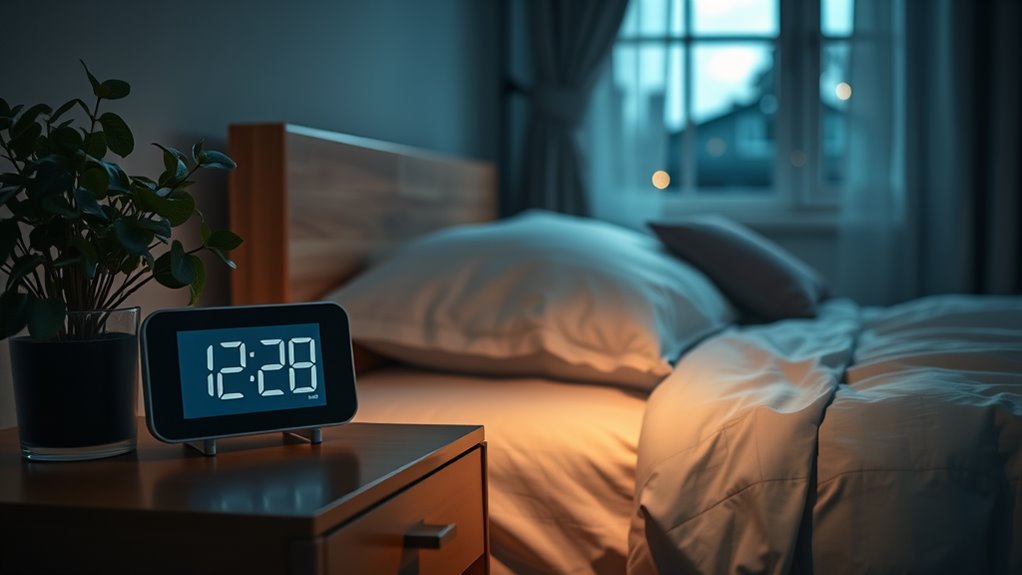
A consistent sleep schedule is the cornerstone of achieving better sleep hygiene and ideal health. By establishing set wake-up and bedtime routines, individuals can synchronize their body’s natural circadian rhythms. This harmony enhances not only the quality of sleep but also overall well-being, improving alertness, productivity, and cardiovascular health.
Adhering to a set schedule, even on weekends, fortifies cognitive functions, mood regulation, and immune strength. Through these practices, the risk of sleep deprivation, accidents, and chronic health issues declines.
Sleep is a crucial component of life, underpinning mental and physical health. A regular sleep schedule contributes greatly to maintaining a healthy weight, strengthening immune defenses, and reducing health risks like hypertension and high cholesterol.
Consistency in sleep patterns allows for the efficient repair of cognitive functions and toxin elimination during rest. As you prioritize maintaining a consistent sleep schedule, you set a foundation for improved heart health, focus, and reduced anxiety.








